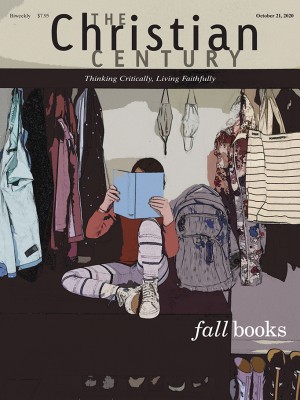November 8, 32A (Joshua 24:1-3a, 14-25; Psalm 78:1-7)
Is our story of struggle also one of faith, hope, and love?
There is a science fiction show called The 100, currently airing its seventh and final season on the CW Network. It depicts the future of humanity after an apocalyptic nuclear war. Over the course of the series, the world “ends” more than once, and the plot complexifies to include entirely different groups of humans who have each survived the catastrophic ordeals that befall them in different ways, whether it’s on a spaceship, deep underground, or on another planet. Over and over again, the various groups struggle and face unbelievable hardship. Over and over again, the show raises the questions, What are we willing to do to survive? Who are our people? What does our past say about who we are? And what world and legacy will we leave for our children?
Both Joshua 24, in which the tribes of Israel renew their covenant with God under Joshua’s leadership, and Psalm 78 depict a people remembering their past and contending with its impact on their future. Joshua reminds the Israelites of their history, that long ago their people worshiped other gods until God made a covenant with Abraham. Like the people in The 100, the Israelites have been through many struggles. Years in slavery, then years spent wandering in the desert. They have survived famine and war. And God, Joshua reminds them, has led them faithfully through it all.
Read our latest issue or browse back issues.
In reminding the people of their history, Joshua also poses a question: Will they remember where they’ve come from—who their people are, the story they’ve inherited—and remain faithful to God in return? Or will they grow complacent, distance themselves from their history, and wander away again to other gods?
The people are adamant that they will remain steadfastly committed to God. “Why would we abandon the one who has protected us and liberated us?” they say. When Joshua stresses that God will not abide any unfaithfulness, the people proclaim, “We will be witnesses!” In other words, we will tell the story: we will be a part of the story that is told forever after of God and God’s people. On this promise, Joshua leads them in renewing the covenant.
Much later, the psalmist writes of the importance of not just remembering the stories but passing them on to future generations. The psalmist further emphasizes that the people cannot remember and pass down a rose-colored version of history. They must remember and tell the full truth, including the hard and the ugly and the scary, and only in so doing will God’s power and faithfulness be fully captured for future generations to know and believe.
“We will not hide them from our children,” the psalmist says.
We are a future generation that has received the stories of the ancestors of our own faith, as well as the stories of the Israelites, about their struggles and ordeals and about God’s faithfulness. And as with the many generations before us, we now face our own season of struggle, upheaval, uncertainty, and ordeal. A global pandemic has upended the world, leveled economies, and thrown both present and future into chaos. Now we are confronted with the same question that once confronted the Israelites: Will we trust in the histories we’ve inherited and place our faith in God, or will we wander away?
When many of the things we came to rely on for comfort, stability, and truth have been tossed into turmoil, we can doubt and waver and despair. Or we can bear witness to the truth of a God who has seen countless generations before us through all manner of hardship that we can scarcely imagine. We can find comfort in the promise that God will see us through as well, if we remain committed to communal care and love and trust.
How we choose to answer the question that confronts us doesn’t only impact us. Like the faithful long ago, how we choose to understand and tell the story of this moment will impact the world that our children and the future generations inherit from us.
In August, Sandi Villarreal of Sojourners wrote an article called “Raising the Coronavirus Generation.” In it, the mother of three, who is managing their schooling at home while working, wonders alongside other parents how this crisis will affect the youngest living generation. Villarreal writes, “The most common fear shared by parents I’ve spoken to is that our kids won’t be OK—that in trying to find the balance between naked truthfulness and parental protectionism, we’ll lean too heavily to one side, that the wrong decisions will leave lasting marks that follow them into adulthood.” One thing, she writes, is clear: like the crises of previous generations, this one will impact how its own generation of children comes to understand the world, themselves, and their faith.
Postapocalyptic shows like The 100 feel eerily relevant these days in ways they didn’t when that show first aired seven years ago. It’s true that the characters are merely the imaginings of the writers, actors, and audience. But it’s also true that our children—and our children’s children, and perhaps, if we’re lucky, generations a hundred or more years from now—will inherit the stories we tell them and the world those stories shape. We know ours is a story of struggle, but is it also one of faith, hope, and love? Or one of destruction and despair?





